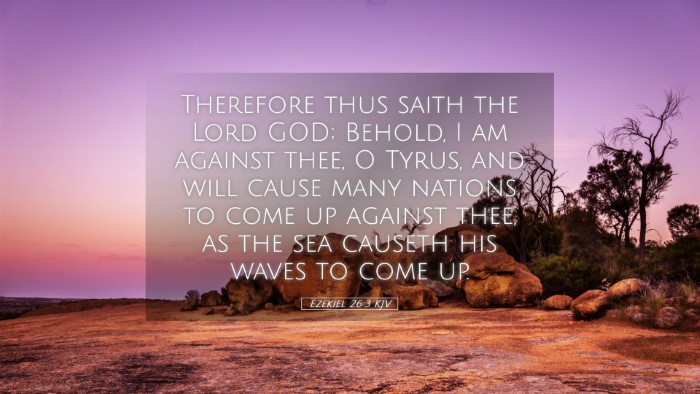Ezekiel 26:3 Commentary
Bible Verse: "Therefore thus says the Lord God: Behold, I am against you, O Tyre, and will bring up many nations against you, as the sea brings up its waves."
Introduction
The prophecy against Tyre in Ezekiel 26:3 serves as a crucial point in understanding the themes of divine judgment, the sovereignty of God, and the transitory nature of human power. This verse is part of a larger oracle concerning the city of Tyre, a significant commercial hub and cultural center of the ancient world. Various public domain commentators offer valuable insights that highlight the theological and historical context of this verse.
The Weight of Divine Judgment
Matthew Henry emphasizes that God’s declaration of being "against" Tyre signifies a profound moral accountability. Tyre, known for its pride and wealth, violated God’s commandments, and thus faced inevitable judgment. Henry notes that this judgment is not arbitrary; it comes as a response to Tyre’s arrogance and infidelity toward the God of Israel.
Albert Barnes explains that the phrase "I am against you" is a statement of divine opposition. Barnes elaborates that when God stands against a nation, it signifies the withdrawal of His protection and blessing, leading to ruin and desolation by the hands of other nations. This principle is echoed throughout the Scriptures, demonstrating that when nations stray from righteousness, they become vulnerable to divine retribution.
The Instruments of Judgment
Both Adam Clarke and Henry discuss the significance of "many nations" being raised against Tyre. Clarke notes the historical invasions that would later occur, particularly by Nebuchadnezzar of Babylon, who played a critical role in the downfall of Tyre. The multitude of nations symbolized the overwhelming force against prideful humanity, as God orchestrates the powers of this world for His purposes.
- Historical Context: Tyre’s invulnerability due to its position and defenses made its destruction a monumental act of God’s wraths - heavily illustrated by the eventual Babylonian conquest.
- Spiritual Interpretation: The term "the sea brings up its waves" metaphorically underscores the unstoppable surge of God’s judgment, suggesting that God’s wrath is as relentless and powerful as the ocean’s tides.
Theological Implications
This verse and the surrounding chapters in Ezekiel provide rich soil for theological reflection. According to Barnes, the prophecy against Tyre serves as a microcosm of God's judgment on all nations that oppose Him. It conveys the message that no nation is beyond the reach of divine accountability.
Henry further suggests that it serves as a warning to contemporary nations and individuals about the fatal consequences of pride and sin. The story of Tyre, amidst its own perceived strength and invulnerability, serves as a reminder to all that it is sin, not strength, that seals a nation’s fate.
Application for Believers
For modern believers, the message of Ezekiel 26:3 holds significant implications. Clarke highlights the necessity for humility and continual reliance on God’s grace. As Tyre was brought low due to its hubris, believers today are called to walk in humility before God, recognizing that all strength and sustenance come from Him alone.
- Encouragement in Trials: Just as God dealt with Tyre, believers can take solace in the knowledge that God has ultimate authority over all circumstances, and He is able to bring justice in His perfect timing.
- Call to Worship: The judgment of Tyre underlines the greatness of God’s sovereignty. Thus, worship must be grounded in the recognition of His power and authority, inspiring reverence and awe among the faithful.
Conclusion
Ezekiel 26:3 warns of the profound consequences of turning away from God. Public domain commentaries by Henry, Barnes, and Clarke provide essential insights into the meaning and application of this verse. They collectively emphasize the themes of divine judgment, the accountability of nations, and the call to humility for the faithful. For pastors, students, theologians, and scholars, this passage serves as both a warning and a profound reminder of God’s sovereignty over human affairs—a theme as relevant today as it was in the days of ancient prophets.


